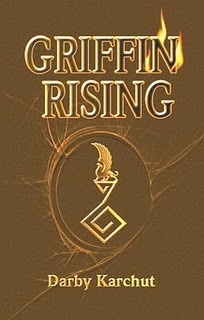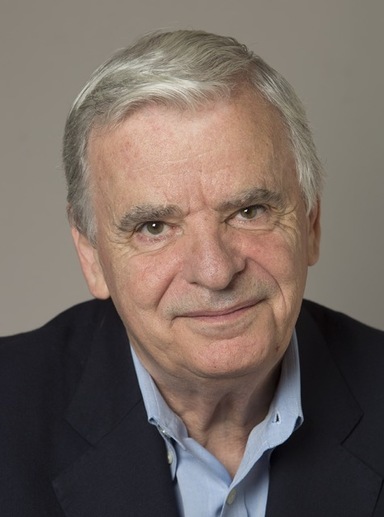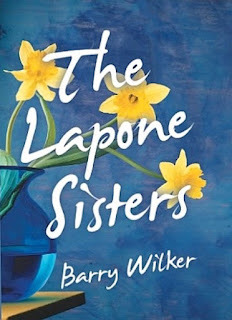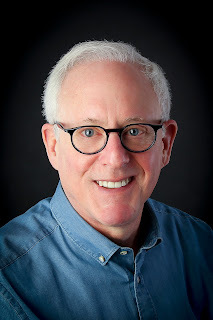Mayra Calvani's Blog - Posts Tagged "coming-of-age"
Meet Darby Karchut, author of the new young adult novel, Griffin Rising
All her life, the archetypal hero and his journey have enthralled Darby Karchut. A native of New Mexico, Darby grew up in a family that venerated books and she spent her childhood devouring one fantasy novel after another. Fascinated by mythologies from around the world, she attended the University of New Mexico, graduating with a degree in anthropology. After moving to Colorado, she then earned a Master’s in education and became a social studies teacher.
Drawing from her extensive knowledge of world cultures, she blends ancient myths with modern urban life to write stories that relate to young teens today.
Darby lives in Colorado with her husband, where she still teaches at a local junior high school. She enjoys running, biking, and skiing the Rocky Mountains in all types of weather. Griffin Rising is her first novel. Visit the author at her website: www.darbykarchut.com.
[image error]Your first teen novel, Griffin Rising, blends ancient myths with modern urban life. Please tell us a little about the book.
For centuries, rumors have abounded of a lowly caste of supernatural beings known as the Terrae Angeli. Armed with the power to control Earth, Fire, Wind and Water, these warriors secretly serve as guardians for mortals in danger.
But for one young angel-in-training, Griffin, life is hell as a cruel master makes his apprenticeship a nightmare. On the verge of failing, a new mentor, Basil, enters his life and changes it forever. It is their father-and-son relationship, sometimes turbulent, often hilarious, always affectionate, that is the heart and soul of the story.
Masquerading as the average teen next door, Griffin struggles to learn his trade, navigate the ups and downs of modern life among humans (including falling in love with the girl next door), and prepare for the ancient trial-by-combat every apprentice must pass at sixteen or be forced to become mortal.
How did your fascination with mythology start?
All my life, the archetypal hero and his journey have enthralled me. A native of New Mexico, I grew up in a family that venerated books and I spent my childhood devouring one fantasy novel after another, especially the works of J.R.R Tolkien and Lloyd Alexander. As a teen, Joseph Campbell’s writings made me aware of the power in the great myths from around the world, so I attended the University of New Mexico and graduated with a degree in anthropology.
Why an angel?
One day, in the summer of 2009, I was browsing in my favorite bookstore and discovered a book about legends from the Middle Ages. Obsessed with all things medieval, I thumbed through it and came across a short paragraph that described a lowly caste of guardian angels that were said to control the ancient elements of Earth, Fire, Wind and Water. Not being particularly interested in angels, I put the book back and forgot all about it.
A few days later, while running the trails in the foothills near my home, the idea of writing a story about clandestine warriors-angels, who live among us while training their young apprentices, just roared up behind me and slammed into my head. Like an avalanche, you might say. And thus Griffin, Basil, and all the other Terrae Angeli were born.
Is the book part of a 3-book series? What is the theme of the series as a whole?
The book is the first in a possible 4-book saga. The theme is simply: On the road to adulthood, every hero-figure needs a father-figure. Once in awhile.
What about your protagonist will make readers want to read about him? What qualities make him a hero?
Griffin is the classic flawed hero. Surviving a brutal past causes him to have moments of self-doubt. Except when a mortal is in peril, than his true nature as a guardian angel shines forth. And, although he is one of the good guys, Griffin can be as snarky as the next teenager, especially to his mentor and surrogate father, Basil.
How would you describe your creative process while writing this book? Since I had never written anything before, I had no idea what I was doing. I was beyond clueless. So I simply wrote the first draft of the book, then went back and studied everything I could about writing. Each time I learned something new, I went back and re-wrote the book. I must have written over twenty drafts before I began submitting it to various agents and publishers. I also read three to four YA novels a week. The more I read, the better I wrote.
How do you balance your teaching job with writing? Do you have a writing schedule? I’ve trained myself to write whenever I have a fifteen-minute block of time: lunch break, after school, evenings, and weekends. It does take discipline, but I love writing, so it’s more like play to me. And I never watch TV. Or cook.
I heard you love the revision process. What about it do you enjoy so much? Most writers find it tedious. OMGosh, I would STILL be revising Griffin Rising if I could. I live to tweak. I find the more I polish a piece of writing, the better it gets. Without exception. For me, the first draft is the hardest part – it’s excruciatingly painful. Even with a strong outline, I have to wrench each scene out of my head word by word. But then once that draft is finished, I dive in and begin tweaking and polishing, adding and taking away.

How did you find Twilight Times Books? Did they offer a contract for the series based on the first manuscript? I began submitting my manuscript to both agents and publishers in the spring of 2010. Since Twilight Times Book has a sterling reputation and is well respected among small and mid-list book publishers, I sent them a copy of the manuscript in April and kept my fingers crossed. In June, I was offered a contract. Subsequently, I have also signed a contract for the next book in the series, Griffin’s Fire.
How do you market your books? It is a multi-pronged approach. Prior to release, I sent out close to 80 copies to various YA book bloggers, reviewers, and local bookstores as well as networking within the YA book world via my own blog and website. Anything and everything to get a “buzz” going. As the school year begins this coming fall, I will also be doing author visits to various middle and high schools in my area. My publisher also sent advanced readers copies to the well-known book reviews such as Library Journal, Foreword, School Library Journal, Booklist, Publisher’s Weekly, and so on.
I understand you’re working on the sequel, Griffin’s Fire. When will this one be out? The release date is tentatively scheduled for April 2012.
Is there anything else you’d like to share with us? I would encourage anyone interested in writing YA books to read extensively in that genre. Best thing you can do as an author is saturate your mind with good writing. There is an old saying: you read and you read and then one day, you throw up a book. Inelegant, but so very true.
Learn the rules of writing, then break them as necessary to make your story better. Everything is about The Story.
Thanks, Darby!
Thank you, Mayra. I had a terrific time visiting with you.

Talking Craft with AA Freda
 Freda was born in Italy but grew up in New York City and now resides in Easton, CT, a suburb of New York City that offers him a tranquil environment that allows him to keep his finger on the pulse of the city he loves so much. A graduate of Bernard Baruch College at the City University in New York, he has served as an adjunct professor at the Fashion Institute of Technology in NYC. Freda also served in Vietnam the subject matter of A Police Action. In addition to writing, in his spare time, Freda enjoys fishing, hiking, climbing and shooting pool.
Freda was born in Italy but grew up in New York City and now resides in Easton, CT, a suburb of New York City that offers him a tranquil environment that allows him to keep his finger on the pulse of the city he loves so much. A graduate of Bernard Baruch College at the City University in New York, he has served as an adjunct professor at the Fashion Institute of Technology in NYC. Freda also served in Vietnam the subject matter of A Police Action. In addition to writing, in his spare time, Freda enjoys fishing, hiking, climbing and shooting pool.Q: Congratulations on the release of your latest book, A Police Action. To begin with, can you give us a brief summary of what the story is about and what compelled you to write it?
A: My book is about two young people starting out and trying to make sense of their lives. Complicating the process is a small war going on in Southeast Asia involving some two million soldiers. A war that our country, for political reasons, refused to even call a war. A Police Action is what our government called this illegal war.
The story details the conflict that these two young adults faced with the war and societies conventions. Sex, living alone, abortions, death and love are all brought out in this story. Can these two-people overcome these life and death situations and manage to hold on to each other? Can they find the love and fulfillment in their lives that they are seeking?
Q: What do you think makes a good Coming of Age/Historical? Could you narrow it down to the three most important elements? Is it even possible to narrow it down?
A: There are several elements important in my genre. The first and foremost are the characters. As young adults, you need to capture the complexity of the thinking in a young mind. I need to get the reader to think as a young person would. The historical part of my genre has a twofold importance. The first is to be absolutely accurate of the facts. The second is to make sure you take the reader to that time and place. Have them see clearly the era that the story is trying to convey.
 Q: How did you go about plotting your story? Or did you discover it as you worked on the book?
Q: How did you go about plotting your story? Or did you discover it as you worked on the book?A: The story is almost semi-biographical so the plotting came easy. Making sure I did not get caught up in the history was the hard part. I wanted to be certain that the character’s personalities were brought out in the book.
Q: Tell us something interesting about your protagonist and how you developed him or her. Did you do any character interviews or sketches prior to the actual writing?
A: This took a little doing and several rewrites. Since the protagonist is a smart, talented individual, but for all intent in purpose was a loser wandering around life aimlessly. I wanted to make sure I gave the reader the right blend of that contrast.
Q: In the same light, how did you create your antagonist or villain? What steps did you take to make him or her realistic?
A: The villain in the form of a Sergeant represents a metaphor. A symbol of the deception that authority, government and military was inflicting on common folks.
Q: How did you keep your narrative exciting throughout the novel? Could you offer some practical, specific tips?
A: To keep all my stories exciting and have the reader engaged, I always narrow my chapters to mini-sub plots and stories. Similar to a television serial. Never forgetting, however that each chapter has a job to lead the reader to a main plot or story line.
Q: Setting is also quite important and in many cases, it becomes like a character itself. What tools of the trade did you use in your writing to bring the setting to life?
A: In this particular instance, it was easy for me to write about the setting. Having fought in the Vietnam war it was simply reaching back into my memory bank and putting it into writing.
Q: Did you know the theme(s) of your novel from the start or is this something you discovered after completing the first draft? Is this theme(s) recurrent in your other work?
A: No, I knew from the start the theme of A Police Action. The foolishness of the war and the effect it had on unsuspecting young people of usually poor back ground. Ordinary people who had values and ideals that may no longer exist.
Q: Where does craft end and art begin? Do you think editing can destroy the initial creative thrust of an author?
A: The craft and art separate with the editing in my opinion. The editor wants to make sure the story moves at a certain pace. The writer on the other hand would like to paint the reader a picture. Editing, while a key component in publishing, can certainly the creativity of the writer.
Q: What three things, in your opinion, make a successful novelist?
A: First would be honesty. Don’t try to fool the reader. Paint the picture correctly.
Second is to be a story teller. Make sure the story you write about is interesting and engaging.
The third is to never forget that writing is not about the author, it is about the reader. The book will be around long after the author is gone.
Q: A famous writer once wrote that being an author is like having to do homework for the rest of your life. What do you think about that?
A: There is truth to that. But it’s nice homework. Not toiling gruesome assignments or subject matters.
Q: Are there any resources, books, workshops or sites about craft that you’ve found helpful during your writing career?
A: No workshops but I can cite at least three teachers that encouraged me to write. These teachers provided me with positive attitude to continue to write. An attitude that I still maintain today.
Q: Is there anything else you’d like to share with my readers about the craft of writing?
A: First, whatever you do, keep writing. Don’t ever get discouraged. If your work doesn’t come out right, go back and fix the errors but don’t give up. Be honest with yourself and your writing. We all can improve our craft. Athletes practice non-stop to get better. Writers should do the same.
An Interview with Barry Wilker, Author of 'The Lapone Sisters'
Barry Wilker spent forty-three years working as an interior designer for a myriad of clients across the United States. Retirement has provided him time to assemble all the fragments of his wild imagination into this, his first novel. He lived for a number of years in the Los Angeles area and currently resides in Nashville, Tennessee. Here's here today to talk about his novel, The Lapone Sisters.
Find out more at www.TheLaponeSisters.com.
INTERVIEW:
Mayra Calvani: Please tell us about The Lapone Sisters and what compelled you to write it.
Author: I hatched the idea of The Lapone Sisters over a period of almost forty years. Being an interior designer for forty-three years was at times a tedious and sometimes a stressful profession. During downtimes in my business, ideas for the story sprang like seedlings that over time grew and multiplied into pieces I knew someday would be a fully realized story. During those free times, I wrote thoughts about these imaginary sisters on pieces of paper and put them into a folder or squirreled them away in the back of my mind. I am really not sure how or why this novel finally came to fruition. Possibly because of Covid and retirement I suddenly had the time to concentrate on the entirety of the story. I pulled out my folder and separated the scraps of ideas into piles in my home office. As I already mentioned, bits and pieces of the story had incubated for more years. I had stacks of unrelated ideas sitting on my desk. For nine months I began to sew together a story and imagine events that propelled my characters into the story they became. It was a fun, tedious, and stressful time.
M.C.: What is your book about?
Author: The Lapone Sisters is a smart and seamless coming-of-age novel centered on the lives of three sisters–and a thoughtful and thought-provoking tale that unfolds against a backdrop of a simpler time and place. The Lapone Sisters introduces the reader to three dazzling and decidedly different sisters: Schmellda, Sorina and Esmerelda. They are wildly disparate, wholly entertaining, and mesmerizingly comical individuals. The three sisters are swept up into a whirlwind of adventure when each begins to chart a course toward discovering purpose, meaning and direction for their lives.
In the summer of 1976, the three sisters launch a journey like no other when each begins the task of uncovering her individual course in the world. Schmellda, the eldest daughter, is a frumpy, self-appointed mother hen cautiously setting out on her own for the first time in her life. Middle sister Sorina is a stunning-and-stuttering beauty tentatively venturing out in search of her dreams. Esmerelda is the youngest and boldest of the three who is outspoken, sharp-tongued and an unfiltered fireball ready to catapult from the nest.
Born to loving parents who provided a safe and nurturing environment, Schmellda, Sorina and Esmerelda could not be more different. When the sisters are swept up in an unimaginable spiral of events that change their lives forever, they discover more about themselves and each other than they had ever dreamed.
The girls compete and commiserate. They take road trips and chances. They get makeovers and they make waves. They grow and bloom and blossom. Even though they change, they remain true to their core selves. Most of all, they follow their hearts. They even fall in love. Over the months of a fateful and blissful summer, the sisters cross paths, cross wits and come across a menagerie of misfits, loners, losers and dreamers making for an adventure like no other. For these three sisters, life will never be the same.
The Lapone Sisters is a beautifully rendered tale that celebrates taking chances, embracing individuality, innocence, and the unmistakeable power of love. Resplendent with charm, peppered with wry humor, sometimes seasoned with satire, and replete with a richly drawn cast of characters, their story is destined to stay with readers long after the last page is turned
M.C.: What themes do you explore in your novel?
Author: Individuality. Innocence. The power of love, acceptance, and coming of age. Stuttering and the power of language. The capability of change. The importance of knowing we are all part of and have contributions to make to a community much bigger than just ourselves.
M.C.: Why do you write?
Author: I write now because I have the time. Being retired, I feel able to do anything. I don’t write for income. I write because I want to write. I wrote this novel because I wanted to show life in an absurdly creative way. I wanted to create a lightness on the surface that opens the reader’s mind to what I consider the truly important themes I mentioned above.
M.C.: When do you feel the most creative?
Author: Since I am not creating beautiful homes for a living any longer and constantly thinking about them 24/7, my imagination is still at full speed. I feel creative all the time.
M.C.: How picky are you with language?
Author: I am very conscientious about language. I consider my writing to how I performed as an interior designer. I was meticulous with my jobs. It was my goal to execute a beautiful and liveable environment for my clients using the best materials and craftsmen available. Words are now my floor plans, fabrics, art and furniture. I want language to be perfect.
M.C.: When you write, do you sometimes feel as though you were being manipulated from afar?
Author: No. Not in the least.
M.C.: What is your worst time as a writer?
Author: When I am a loss for an idea. When I am at a loss for the correct word. When I wake up in the middle of the night and realize that I missed something in a time line. When I am somewhere and I have a great idea and have no way to write it down.
M.C.: Your best?
Author: The opposite of all of the above . . . the times when thoughts, ideas and the rest flow seamlessly.
M.C.: Is there anything that would stop you from writing?
Author: I suppose if my debut novel does not work out for Joe Public. I would not stop writing. I would stop publishing.
M.C.: What’s the happiest moment you’ve lived as an author?
Author: When the three editors and I came to the “Aha!” moment that set my manuscript free to go to print.
M.C.: Is writing an obsession to you?
Author: It certainly was an obsession while I was writing The Lapone Sisters. Long ago in school I loved to write poetry. At the moment, writing isn’t quite the obsession it was. I’ve told my primary story. Now I have other loves. I paint, sculpt, read. I am 69 and retired. Now is mostly play time.
M.C.: Are the stories you create connected with you in some way?
Author: The only part of The Lapone Sisters that connects me to my novel is I was once a stutterer. I still am at times. I really wanted to raise awareness of how stuttering as an adolescent affects a person.
M.C.: Ray Bradbury once said, “You must stay drunk on writing so reality cannot destroy you.” Thoughts?
Author: I don’t agree. I wrote this novel as a contrast to the chaos, hate and negativity in today’s society. I wanted to write a happy and meaningful book that was filled with positive and humorous distractions.
M.C.: Do you have a website or blog where readers can find out more about you and your work?
Author: www.TheLaponeSisters.com. But really, after anyone reads this blog they know more about me than what is on my website. I would like to thank you for reading this and hope that you will read my novel The Lapone Sisters. I also want to emphasize to readers that I have two footnotes in my novel on pages 199 and 300 that reference songs I sincerely hope they will listen to before turning the page. And again, thank you!
Barry’s book, The Lapone Sisters, is available from your favorite online retailer.





